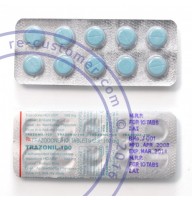Trazodone is a medication primarily prescribed for its antidepressant effects, particularly in treating major depressive disorder (MDD). It belongs to a class of medications known as serotonin antagonist and reuptake inhibitors (SARIs). In addition to its antidepressant properties, trazodone is also used off-label to treat insomnia due to its sedative effects.
The main mechanism of action of trazodone involves affecting serotonin levels in the brain by blocking serotonin receptors and inhibiting its reuptake. This helps alleviate symptoms of depression and can promote sleep in lower doses.
As with most medications, trazodone can cause side effects. Common side effects include:
Drowsiness and Sedation: Trazodone is known for its sedative effects, which can cause drowsiness and impair alertness, especially when starting treatment or when doses are increased.
Dry Mouth: Many people experience dry mouth as a side effect of trazodone.
Dizziness: Some individuals may feel dizzy or lightheaded, particularly when standing up quickly.
Blurred Vision: Trazodone can affect vision temporarily, causing blurred vision or difficulty focusing.
Constipation or Digestive Issues: Digestive disturbances such as constipation or nausea can occur.
Weight Changes: Some people may experience weight gain or weight loss while taking trazodone.
Less common but potentially serious side effects of trazodone include:
Serotonin Syndrome: This is a rare but potentially life-threatening condition caused by excessively high levels of serotonin in the body, which can occur if trazodone is combined with other medications that also increase serotonin levels.
Priapism: This is a painful and prolonged erection of the penis that can occur with trazodone use, though it is rare.
Heart Rhythm Changes: Trazodone can affect the electrical activity of the heart in some individuals, leading to irregular heartbeats (arrhythmias).
Allergic Reactions: Allergic reactions to trazodone are rare but can include rash, itching, swelling, severe dizziness, or difficulty breathing.
Withdrawal Symptoms: If trazodone is stopped suddenly, it can lead to withdrawal symptoms such as anxiety, agitation, and insomnia.
Before starting trazodone or any new medication, it's crucial to discuss potential side effects with your healthcare provider. They can help you understand the risks and benefits of treatment and monitor you for any adverse effects while on the medication. Adjustments to the dosage or switching to a different medication may be necessary based on your individual response and medical history.

